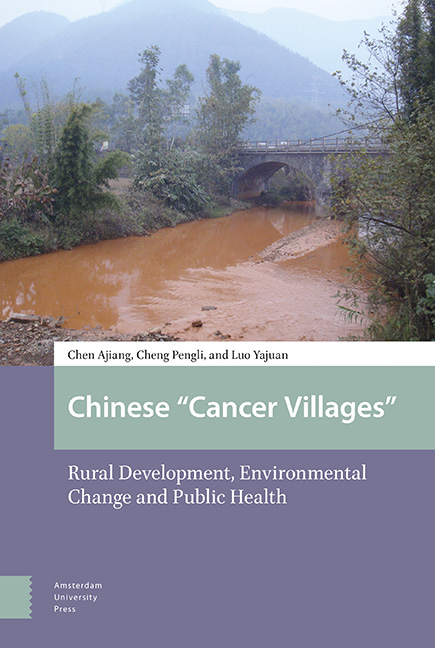Book contents
- Frontmatter
- Contents
- List of Figures, Graphs and Tables
- Acknowledgements
- Preface to the English Language Edition
- 1 Retrospective Thoughts on the ‘Cancer Village’ Phenomenon
- 2 The Ins and Outs of a ‘Cancer Village’
- 3 A Subei ‘Cancer Village’
- 4 Environmental Change and Health Risks
- 5 A Prosperous ‘Cancer Village’
- 6 Coexistence of Poverty and Cancer
- 7 Problematization and De-stigmatization
- 8 Behind the ‘High Incidence of Lung Cancer’
- 9 Villagers’ Perceptions of and Responses to the Relationship between Cancer and Pollution
- 10 Villagers Strategies for Mitigating Environmental Health Risks
- Index
- Index (Chinese) 中文索引
9 - Villagers’ Perceptions of and Responses to the Relationship between Cancer and Pollution
Published online by Cambridge University Press: 20 November 2020
- Frontmatter
- Contents
- List of Figures, Graphs and Tables
- Acknowledgements
- Preface to the English Language Edition
- 1 Retrospective Thoughts on the ‘Cancer Village’ Phenomenon
- 2 The Ins and Outs of a ‘Cancer Village’
- 3 A Subei ‘Cancer Village’
- 4 Environmental Change and Health Risks
- 5 A Prosperous ‘Cancer Village’
- 6 Coexistence of Poverty and Cancer
- 7 Problematization and De-stigmatization
- 8 Behind the ‘High Incidence of Lung Cancer’
- 9 Villagers’ Perceptions of and Responses to the Relationship between Cancer and Pollution
- 10 Villagers Strategies for Mitigating Environmental Health Risks
- Index
- Index (Chinese) 中文索引
Summary
Abstract
It is difficult for medical science to establish a clear relationship between cancer and pollution at the village level due to the small population size and the multi-causality of many cancers. But ‘cancer villages’ nonetheless exist as a social fact and they continue to affect the lives of villagers. In the face of health risks, and uncertainty about them, villagers try to avoid pollution by getting polluting industries to shut down or relocate, moving away themselves, and changing their water sources and diet. Economic circumstances affect the degree to which they can deploy these various strategies. Their responses are also shaped by the inherited social structure, including the power of the village clan, local ‘gentry’, and the work unit.
Keywords: causes of cancer, water pollution, social structure, local knowledge, village traditions
Introduction
We first encountered the phenomenon of ‘cancer villages’ while conducting research for the project ‘On Harmony Between People and Water’. Further investigation showed that there were big discrepancies between our expectations and media reports, and the actual health problems caused by pollution. We observed that as pollution got worse, the incidence of disease would increase; but at a certain point, even as pollution continued to become more severe, the incidence of disease might start to stabilize or even decrease. We can assume that this is because when certain abnormalities begin to appear in the incidence of sickness or death, villagers take defensive measures to avoid harm, and so even if pollution continues to worsen, after reaching a peak, the rate of disease will not continue to rise and may sometimes even fall. However, due to the lack of detailed empirical material, we did not pursue further research on this issue at that time.
In December of 2010, we conducted a study on environment and health in Shangba Village and Liangqiao Village in Shaoguan, Guangdong; Jiannan Village in Shangrao, Jiangxi; and Xiqiao Village in Jiaxing, Zhejiang. These four villages all suffered from relatively severe industrial pollution, the incidence and mortality rates of cancer were abnormal, and the villages were referred to by local people or the media as ‘cancer villages’.
- Type
- Chapter
- Information
- 'Chinese Cancer Villages'Rural Development, Environmental Change and Public Health, pp. 255 - 282Publisher: Amsterdam University PressPrint publication year: 2020



